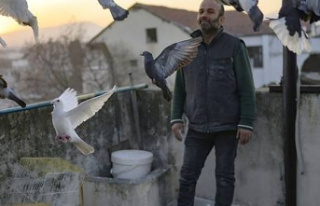This is a first since the start of the war in Ukraine. U.S. Vice President Kamala Harris has accused Russia of perpetrating "crimes against humanity" since it began its invasion of Ukraine nearly a year ago, warning that those responsible will have to "to realize".
Speaking at the Munich Security Conference, Kamala Harris, a former prosecutor, gave a chilling enumeration of abuses attributed to Moscow, citing systematic bombings targeting civilians and critical infrastructure, torture and rape attributed to Russian soldiers, the deportations of Ukrainians to Russia, including thousands of children separated from their families.
"We have looked at the evidence, we know the legal standards and there is no doubt: these are crimes against humanity," she said. "And I say to all those who perpetrated these crimes and to their superiors or accomplices in these crimes: you will account for it," she warned.
Since the start of the invasion, the United States has documented or documented more than 30,600 cases of war crimes committed by Russian forces in Ukraine, the US State Department said.
Ukrainian Foreign Minister Dmytro Kouleba welcomed the US statement and again accused Moscow of "genocidal war" in Ukraine, during a press conference on the sidelines of the conference.
However, he expressed concern that it may not be possible to gather enough evidence to prosecute "specific individuals" who have committed "atrocities".
kyiv has called for the establishment of a special tribunal to try Russia's top officials, but its exact form raises complex legal issues.
In tune with her allies, the American vice-president reaffirmed that the United States - by far the main supplier of weapons to Kiev - would support this country "as long as it takes" and she reiterated the solidity of the transatlantic bond and NATO against Russia.
Earlier, NATO Secretary General Jens Stoltenberg warned of a defeat for Ukraine, as Russia is mobilizing "hundreds of thousands of troops".
“The biggest risk of all is that Putin wins. If Putin wins in Ukraine, the message for him and other authoritarian leaders will be that they can use force to get what they want,” he warned.
Almost a year after the launch of the Russian invasion on February 24, 2022, there is no sign of appeasement in sight.
Russian troops have seized almost a fifth of Ukrainian territory, the fighting has claimed tens of thousands of victims on both sides, and NATO fears a new large-scale offensive from Moscow soon.
The Europeans hope to convince China, which remains a close ally of Moscow, to use its influence on the master of the Kremlin to end the war.
Beijing, currently at odds with Washington over a spy balloon affair, must "play a responsible role" in the current situation, British Prime Minister Rishi Sunak has said.
But Chinese Foreign Minister Wang Yi presented his country as a champion of "peace" and reiterated in Munich that it was up to Moscow and Kiev to "sit around the table and find" a "political" way out. to the conflict.
The general feeling on the side of the allies and the Ukrainians is that the war is likely to be prolonged, as French President Emmanuel Macron and German Chancellor Olaf Scholz had already estimated on Friday during the first day of the Conference which is due to end on Sunday. .
This is why it is essential to accelerate the production of standard armaments, such as ammunition, which Kyiv "desperately needs", said Commission President Ursula von der Leyen. EU members are currently exploring ways to make joint ammunition purchases for Ukraine, according to diplomatic sources in Brussels.
The allies support Ukraine through financial, humanitarian and military aid, including heavy Western-made tanks, even if they are slow to arrive on the ground, and through drastic economic sanctions against Russia. Ukraine is also crying out for combat planes from the allies, who remain reluctant at this stage.
On Saturday, hundreds of people demonstrated in the streets of Munich, some to support Ukraine, others on the contrary to express their disagreement with the delivery of arms to the country.
Consult our file: War in Ukraine












